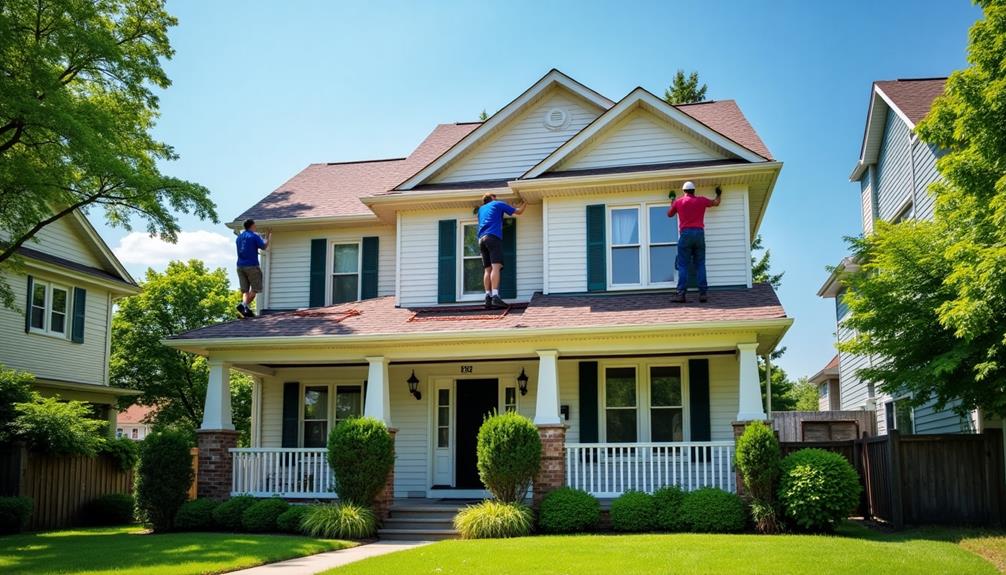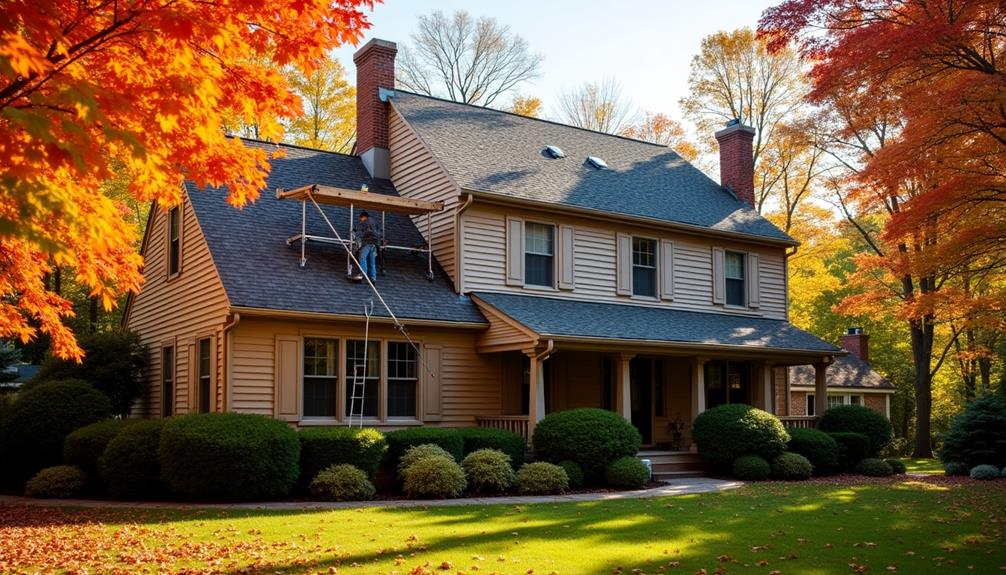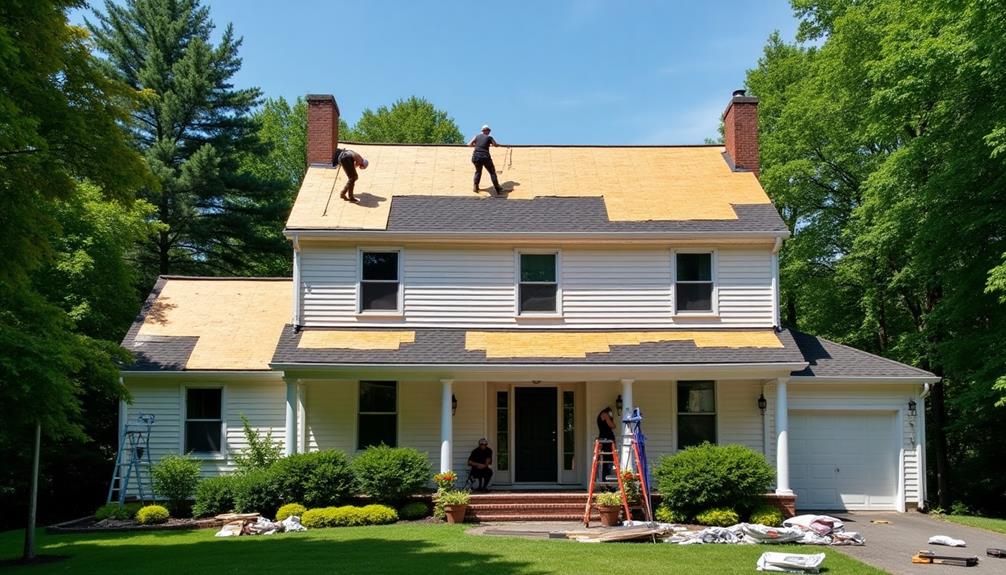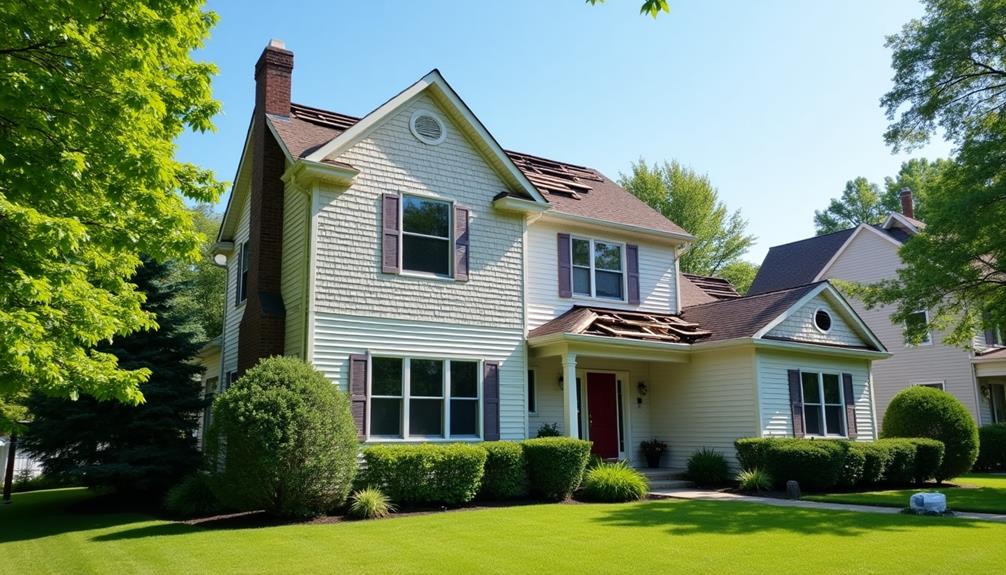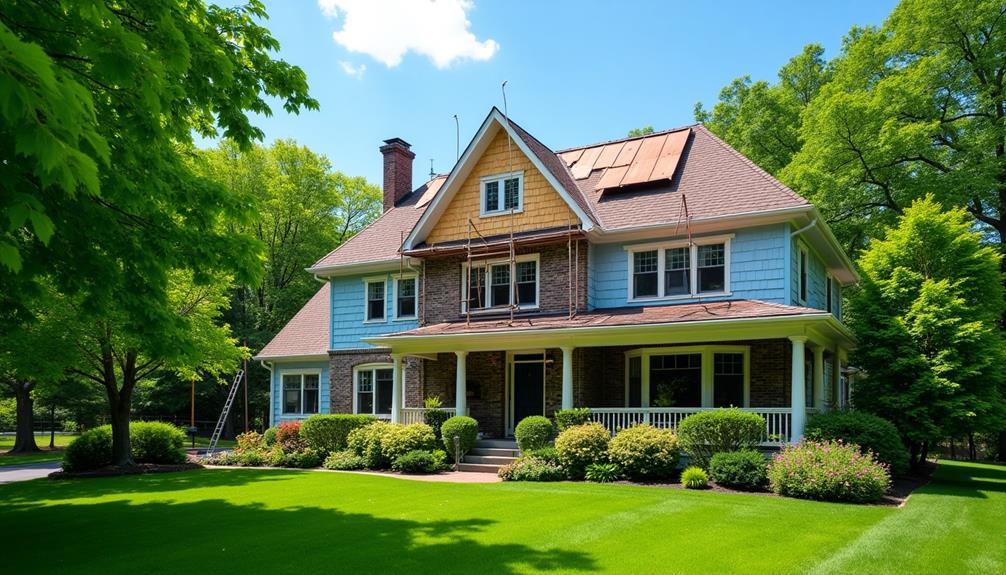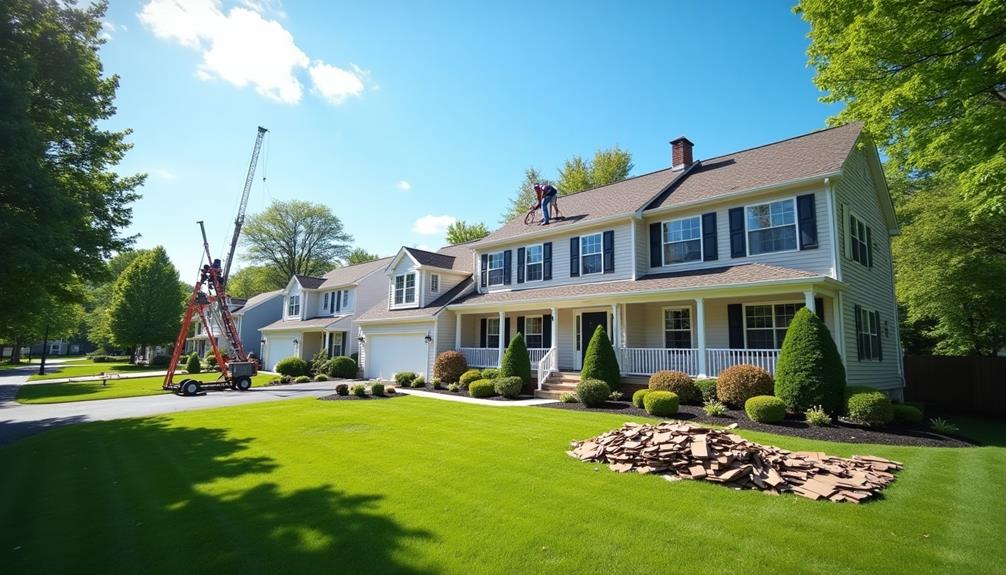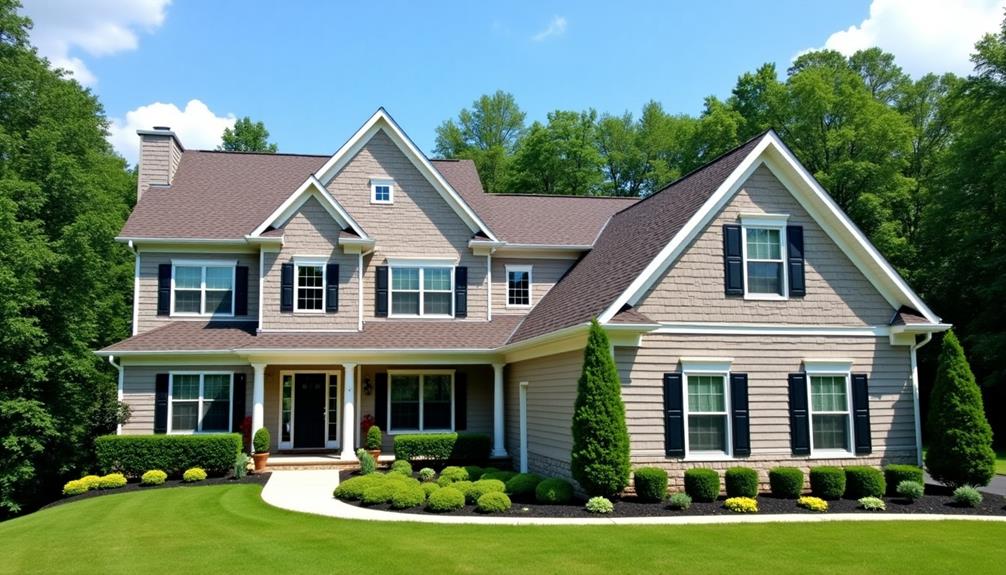If you're considering roof replacement in Irvington, NJ, start by assessing your current roof's condition. Look for signs like persistent leaks, curling or missing shingles, and water stains on ceilings. A new roof can enhance energy efficiency and boost your property's value. When choosing materials, consider your local climate and personal aesthetic preferences. To ensure a smooth process, find reliable contractors who are licensed and insured, compare quotes, and check for warranties. Understanding the roof replacement process can save you time and stress, and there's much more to explore about material choices and maintenance options.
Signs You Need a Roof Replacement
Your roof is your home's first line of defense against the elements, and recognizing when it needs replacement is crucial. One of the primary signs you need to look for is persistent leaks. If you've conducted leak detection and found multiple areas of water intrusion, it's likely time to consider a replacement.
Over time, roofs deteriorate due to exposure to weather conditions, which can significantly reduce their lifespan.
Another indicator is the condition of your shingles. If you notice curling, missing shingles, or granules collecting in your gutters, these are signs your roof may be nearing the end of its effective life.
Additionally, interior indicators like water stains on ceilings or walls signal that your roof isn't performing as it should.
Increased energy bills can also reflect an aging roof, as poor insulation leads to heat loss or gain. If you find yourself frequently repairing your roof, weigh those costs against a full replacement.
Benefits of Roof Replacement
Replacing your roof can significantly enhance your home's energy efficiency by preventing air leaks and improving insulation.
This upgrade not only reduces your energy bills but also boosts your property's value, making it a smart long-term investment.
Understanding these benefits can help you make an informed decision about your roof replacement in Irvington, NJ.
Enhanced Energy Efficiency
Frequently overlooked, the energy efficiency of your home significantly improves with a roof replacement. An old or damaged roof can lead to substantial heat loss, causing your heating and cooling systems to work harder. By replacing your roof, you can enhance insulation improvements, which help maintain a consistent indoor temperature and reduce energy consumption.
During an energy audit, you'll often discover that a well-insulated roof plays a crucial role in your home's overall energy performance. New roofing materials, combined with proper insulation, create a barrier against external temperature fluctuations, reducing the need for excessive heating or cooling. This not only leads to lower utility bills but also contributes to a more comfortable living environment year-round.
Choosing energy-efficient roofing options, such as reflective shingles or additional insulation, can further maximize these benefits. By investing in a roof replacement, you're not just updating your home's exterior; you're also taking a significant step toward improved energy efficiency.
Ultimately, this decision results in financial savings and a reduced environmental footprint, as your home becomes more sustainable and energy-conscious.
Increased Property Value
A new roof not only boosts energy efficiency but also significantly increases your property's value. When you consider selling your home, potential buyers often prioritize a reliable roof. This improvement can lead to a higher home appraisal and enhanced resale value.
| Benefit | Impact on Property Value |
|---|---|
| Improved Aesthetics | Attracts more buyers |
| Enhanced Durability | Reduces future repair costs |
| Energy Efficiency | Lowers utility expenses |
| Modern Materials | Increases market appeal |
Investing in a roof replacement creates a solid return on investment. Homes with new roofs tend to sell faster and at a premium compared to those needing repairs. Real estate professionals frequently note that a well-maintained roof is a critical asset during negotiations, influencing prospective buyers' perceptions.
Choosing the Right Materials
When choosing materials for your roof replacement in Irvington, NJ, consider durability, climate-specific options, and your aesthetic preferences.
Different materials offer varying levels of resistance to weather conditions, so it's crucial to match the right type to your local climate.
Additionally, the style you select can significantly impact your home's overall appearance and value.
Material Durability Considerations
Choosing the right materials for your roof replacement in Irvington, NJ, boils down to understanding their durability and performance under various conditions. You'll want to assess factors like material lifespan and weather resistance to ensure your investment lasts.
Different roofing materials come with varying levels of durability. Here's a quick comparison to help you make an informed choice:
| Material | Lifespan | Weather Resistance |
|---|---|---|
| Asphalt Shingles | 15-30 years | Moderate |
| Metal Roofing | 40-70 years | High |
| Slate | 75-100 years | Very High |
Asphalt shingles, while affordable, may not withstand harsh conditions as well as metal or slate. Metal roofing offers excellent durability, making it suitable for extreme weather, while slate is the gold standard for longevity and weather resistance.
When selecting your roofing material, consider your budget and the specific environmental challenges your home faces. A durable roof not only protects your home but also enhances its value. Choose wisely to ensure you're covered for years to come.
Climate-Specific Options
Considering the unique climate conditions in Irvington, NJ, selecting the right roofing materials is crucial for ensuring optimal performance and longevity. The region experiences a mix of humidity, temperature fluctuations, and precipitation, so you'll want to choose weather-resistant materials that can withstand these factors.
Asphalt shingles are a popular choice due to their affordability and adaptability. They come with various ratings for wind and impact resistance, making them suitable for your local climate.
Metal roofing is another excellent option; its durability and resistance to moisture can help prevent issues like rust and mold. Ensure that any metal roofing you choose complies with local building codes to avoid future complications.
If you're considering tile or slate, keep in mind their weight and structural requirements. These materials are highly durable and weather-resistant, but they may require additional support to meet local regulations.
Always consult a professional to evaluate your specific needs and ensure compliance with local building codes. Making informed choices about roofing materials won't only protect your home but also enhance its overall value.
Aesthetic Preferences and Styles
Selecting roofing materials not only involves functionality but also encompasses aesthetic preferences that can significantly influence your home's curb appeal. When choosing the right materials, consider how they align with your home's architectural style.
For modern designs, sleek materials like metal or flat roofing can enhance a contemporary look. These options often come in a variety of colors and finishes, allowing you to customize your roof to complement your home's overall aesthetic. Additionally, eco-friendly materials, such as green roofs or solar tiles, can further modernize your property while promoting sustainability.
On the other hand, if you're drawn to traditional aesthetics, consider materials like asphalt shingles, wood shakes, or slate tiles. These options can add charm and character, resonating well with classic architectural styles.
Ensure that the colors and textures you choose harmonize with existing exterior elements, like siding and trim.
Ultimately, your roofing choice should reflect your personal style while maintaining balance with the surrounding environment. By thoughtfully selecting materials that align with your aesthetic preferences, you'll enhance not only your home's appearance but also its value.
Finding Reliable Contractors
Finding reliable contractors for roof replacement in Irvington, NJ, can feel daunting, but it's crucial for ensuring quality work. Start by verifying contractor qualifications. Check for proper licensing, insurance, and certifications. This not only protects you from liability but also ensures the contractor meets industry standards.
Next, seek recommendations from friends, family, or online reviews. A solid reputation often reflects a contractor's reliability and work quality.
Once you've narrowed down your options, request detailed estimates from at least three contractors. These estimates should outline the scope of work, materials used, and, importantly, the project timeline. A clear timeline helps set expectations and minimizes delays.
During your consultations, don't hesitate to ask about their experience with similar projects. Understanding their approach and problem-solving capabilities gives you insight into their reliability.
It's also wise to inquire about warranties on both materials and workmanship. This can save you money in the long run.
Ultimately, finding the right contractor involves thorough research and clear communication. By focusing on qualifications and timelines, you'll be well-prepared to make an informed decision for your roof replacement project.
The Roof Replacement Process
Understanding the roof replacement process is essential for homeowners in Irvington, NJ, as it involves several critical steps.
First, start with a thorough roof inspection. A qualified contractor will assess your roof's current condition, identifying any underlying issues that need to be addressed before installation begins. This inspection helps determine the scope of work and informs your installation timeline.
Once you've agreed on the project scope, the contractor will provide a detailed estimate, including material recommendations and costs.
After you've signed the contract, the next phase involves securing necessary permits, which may take additional time depending on local regulations.
On the scheduled installation day, your contractor will remove the old roofing materials and prepare the deck for the new roof.
This process includes any necessary repairs to the underlayment or decking. During installation, ensure that the contractor adheres to best practices for your chosen roofing system.
Maintaining Your New Roof
Regular maintenance is crucial to prolonging the lifespan of your new roof and ensuring it performs optimally. To achieve effective roof care, start by conducting visual inspections at least twice a year. Look for missing, damaged, or curling shingles, as these can lead to leaks and other issues.
Another vital maintenance tip is to clean your gutters regularly. Clogged gutters can cause water to back up, damaging your roof and fascia. Ensure downspouts direct water away from your foundation to prevent moisture accumulation.
You should also trim overhanging branches to reduce the risk of debris accumulation and potential punctures from falling limbs. Excessive debris can trap moisture, leading to mold and rot.
If you notice any signs of trouble, like water stains on your ceiling or increased energy bills, address these issues promptly. Consider scheduling professional inspections every few years to catch problems early.
Lastly, ensure your attic is properly ventilated to regulate temperature and humidity levels. This prevents ice dam formation in the winter and prolongs your roof's life.

